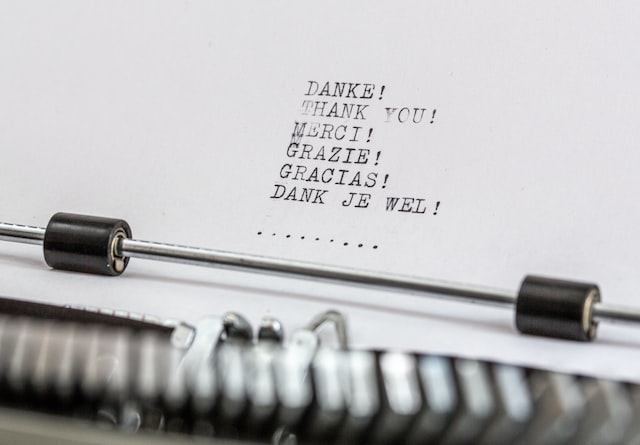Among we mere mortals, “thank you” is one of the first phrases we teach our children. It’s also one of the few phrases (sometimes the only one) we learn in other languages. Most of us are familiar with “Gracias,” “Merci,” “Grazie,” “Arigato,” or “Bitte,” after all.
Saying “thank you” is such a fundamental part of our linguistic makeup, in fact, we usually don’t think about it. We utter it dozens of times a day: to the salesclerk who rings up our groceries, to the person who holds open a door, to the tech support rep on the phone, to the toddler who hands us a crayon. We even sometimes thank inanimate objects, like the car for starting up on a cold winter morning, or the coffee pot for still having a cup’s worth of coffee waiting for us, hot and steaming.
In most human cultures, expressing gratitude is an important, yet completely unremarkable, aspect of communication. It’s so fundamental we seldom stop and really think about it, even on days dedicated to giving thanks.
But what happens when we, as authors, create our brand-new worlds, whether an alien planet or a contemporary Chicago neighborhood?
As Thanksgiving approaches this year, I have been thinking about what storytellers do with the concept of gratitude and what saying “thank you” might mean to our characters.
For example, in volume 4 of his Teutonic Mythology, Jacob Grimm (the editor, of course, of Grimm’s Fairy Tales) mentioned a German superstition that warned against thanking a witch, because it would place you under her power.
In speculative fiction (which can encompass science fiction, fantasy, and the myriad variations of those), the author can invent wildly different cultures, traditions, religions, histories, mannerisms, and beliefs for their characters and worlds. They can conjure up new taboos, rituals, superstitions, blessings, or punishments. And authors do this because it lets them explore the human condition through different lenses, under different pressures, to see what human truths may be revealed. How gratitude is expressed, acknowledged, or avoided can be a part of this new society.
In the rich oral and written traditions of fairy lore, saying “thank you” to a fairy is often said to anger the fairies and make them disappear, sometimes taking their gift with them. Reasons vary, but many stories say the fairies feel the phrase “thank you” is too easy to utter without actual consideration of the fairy’s act or gift, belittling the gift. Or perhaps it negates the gift by acknowledging it, since fairies in a particular story may derive some sense of satisfaction from performing the act in secret.
Still other fairy lore authors say “thank you” puts the character expressing gratitude into the fairy’s debt or may even forge a life-bond between the two that the fairy may not welcome. Or it may be simply that fairies hate to be seen or spoken to by humans, and it’s not the phrase “thank you” that upsets them as much as the fact that they were spied upon by a human. (For more about fairy lore and gratitude, check out the article “Gratitude, Thanks, and Fairy Etiquette,” https://writinginmargins.weebly.com/home/gratitude-thanks-and-fairy-etiquette)
Science fiction writers occasionally use these same ideas in their fictional worlds, where saying “thank you” creates an obligation or a life-debt between the thankee and the thanker.
But you don’t have to be writing speculative fiction to consider how your characters feel about gratitude and giving thanks. It’s an intriguing character trait in any genre. Is one of your characters reluctant to say thank you, and if so, why? Is there something in their backstory that makes them shy away from expressing thanks? Do they avoid feeling beholden to someone else? Do they recognize that expressing gratitude can forge stronger relationships, which they’re afraid of? Do they show their thanks with words or with actions? Do they keep a gratitude journal? Are they genuine in their gratitude, or do they hide their true intent behind a mask of false gratitude? Or are they truly grateful for even the tiniest acts of kindness in their life?
Sitting with friends and/or family at the Thanksgiving table this year might be the perfect time to consider what “thank you” means to your characters—and to you. And if you whip out a notebook and start jotting down ideas for your characters somewhere between the last scoop of stuffing and the pumpkin pie, I’m sure no one will mind—especially if you say, “Thank you for loving me and my writerly foibles.”
[photo by Wilhelm Gunkel on Unsplash]


Thank you for another great idea.